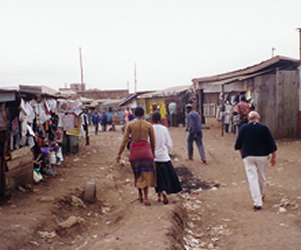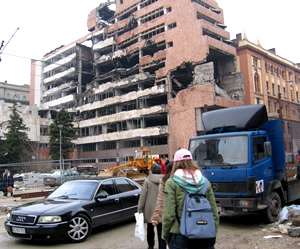Advice for First-Year Students: Fall Semester, 2006
Welcome to Notre Dame! You can be justifiably proud that you have arrived at this great university. Now is the time to get to work. Here’s some advice about how this course and others like it will challenge you to make the most of your educational opportunities over the next four years.
- High school is history. All of you have gone through different types of high schools, Catholic and secular, public and private, big and small, good and bad. The chances are good that your secondary education was based upon two pedagogical principles: description and memorization. Now everything changes. In my class and, I hope, in other social science classes, the emphasis is on analysis and understanding. Thus, in my course, I will take for granted that you can learn lots of facts if you do not already know them. Instead, I am more interested in how you analyze those facts and assess their importance.
- Your new problem. You have been admitted to Notre Dame because you are smart. But now that you are here, everyone around you is smart, too. So what do you do? One of the major reasons I emphasize understanding in this course, and not description, is that I want you to acquire the tools to carve out your own niche in the world. In the case of this course, if you can understand the meaning and significance of recent events in Iraq, Lebanon, Cuba, North Korea, Iran, Venezuela, and other exciting places, you will be in a position to think for yourself. What more can there be?
- Why Notre Dame? American college students typically self-select among universities that reflect their temperament. There must have been something special about Notre Dame that led you to choose it over other institutions, such as Southwestern State U., USC, the Leland Stanford Jr. University, or some finishing school in Princeton, New Jersey. Did Notre Dame's status as a great Catholic university shape your thinking? What kind of education should a Catholic university offer you that will set it apart from the rest?
- Privilege and Responsibility. University education is a privilege that few people in the world experience. Along with privilege comes great responsibility. From the first moment you are here, you should ask yourself not only what you want to do with your life but why your life should matter to the rest of humanity. At most universities, students are treated like little electrons in search of electricity (“to bond or not to bond”). Because Notre Dame is a Catholic university, we expect much more of you.
Now, consider the three images below. Can any university legitimately expect you to be indifferent to these politically-relevant phenomena? Could you tolerate one that would? The first image, which I took in 1999, is of one of urban Africa’s largest shantytowns, Dandora, Kenya. The second photo is of the Berlin Wall in 1981, which I experienced scores of times while living in East and West Berlin before 1989. Finally, I took the third photo last spring, in Belgrade, Serbia. It depicts the former Foreign Ministry of the Yugoslav federation, which was destroyed by NATO precision-guided cruise missiles in 1999 and remains largely untouched today.
Dandora, Nairobi, in 1999. Note what passes for a sewer system in the middle and on the left sides of the photo. This is one of the more decent parts of the shantytown.
A view of the Berlin Wall (Potsdamer Platz, now an ugly commercial center) in 1981. A number of people were shot to death at precisely this point because they sought to do nothing more controversial than than to go from one part of Berlin to the other.
Foreign Ministry, Belgrade, Serbia, March 2006. Note the pristine condition of the building behind it This building and three others were destroyed by NATO cruise missiles in 1999; none have been rebuilt. Remind me to tell you about the black Audi.
So, poverty, dictatorship, and war.... Not a bad way to start thinking about politics!
Notre Dame takes a special interest in the education of each student. If a professor is indifferent to your education, something is wrong. By the same token, you must take personal responsibility for what you learn. It is up to you to work hard on your papers, attend class regularly, do your readings, and visit your professors during office hours. Your years at Notre Dame will speed by, and then suddenly you will find yourself in a work-a-day existence that is far from intellectually challenging. Imagine yourself frozen and calcified in a world of mind-numbing, tedious triviality, where every moment seems like an eternity and has about as much meaning as Mars dust. What if you did not read Plato's Republic, The Brothers Karamazov, Ulysses, the Holy Bible, Machiavelli, or Eliot and Yeats, when you had the chance? What if you did not stand spellbound before one of Gustav Klimt's paintings or, on the Notre Dame campus, view Ivan Mestrovic's Pietà in Sacred Heart Basilica? What if you did not listen to Beethoven's Seventh Symphony?
Enjoy your classes. I know, they are not always scintillating. Still, there are a lot harder things you could be doing for the next four years, such as working in a cubicle, driving a truck, selling household appliances, or putting your life on the line in armed combat. Spiritually speaking, we don’t really know why each of us has been given this special blessing of having time to cultivate our minds. "Time" is the luxury of the affluent classes. Thus, you are making a huge mistake if you treat your studies like a distraction.
I have two fairly modest goals in teaching this course. First, I want to transform your understanding of modern politics completely. For this reason, I will go out of my way to provoke you, even if this means occasionally encouraging you to question everything you believe. Second, I want to sleep in the White House. I am realistic and I know that this honor may take time to arrange. However, I only need one of you to fulfill my dream.
I am glad you are in my class. I look forward to meeting each of you.AJM
Nanovic Institute for European Studies - 211 Brownson Hall - University of Notre Dame - Notre Dame IN 46556 USA
amcadams@nd.edu - Tel. (574) 631-5253 - Fax (574) 631-3569


